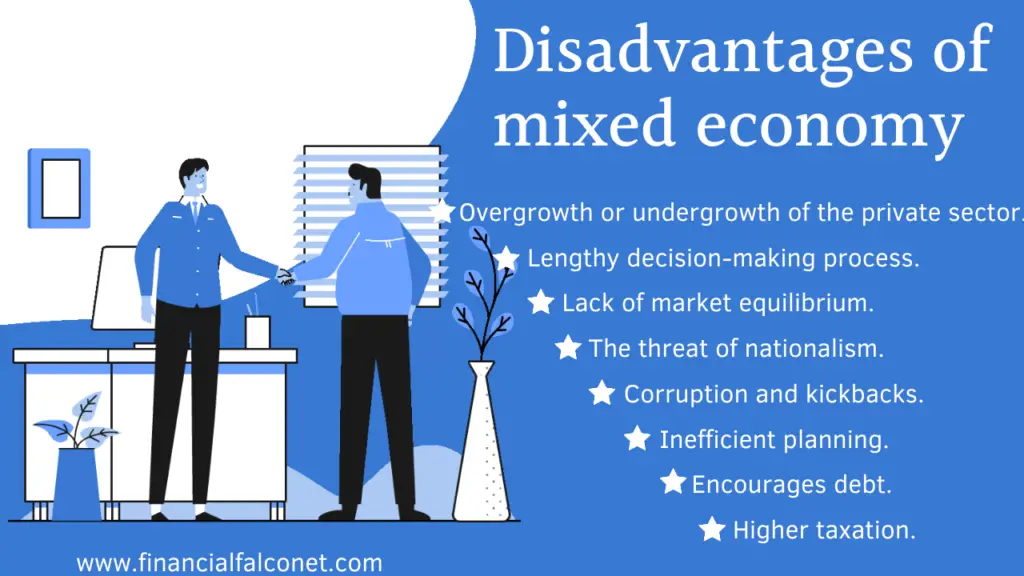All economies in existence have both disadvantages and advantages. In this article, the mixed economy disadvantages shall be our focus of discussion. A mixed economy as the name implies is a type of economy that combines two different economic systems as one. These two economic systems are the unregulated economy which is associated with a free market and the command economy which is associated with socialism.
The combination of these two economic systems is referred to as the mixed economic system. This, therefore, means that the disadvantages of the mixed economy are also an aggregation of the disadvantages of the free economy as well as that of the socialist economy. Let us look at these mixed economy disadvantages below:
See also: Ordoliberalism definition and characteristics
Mixed economy disadvantages
- Corruption and kickbacks
- Encourages debt
- Higher taxation
- Inefficient planning
- Lack of market equilibrium
- Lengthy decision-making process
- Overgrowth or undergrowth of the private sector
- Threat of nationalism
We shall expound on each disadvantage of a mixed economy.
Corruption and kickbacks
One of the mixed economy disadvantages is the propensity for corruption and kickbacks to become prevalent in all economic activities that occur within the society. This often results from the intervention of government in the market and the bid of private firms to make a profit. Companies may engage in giving kickbacks to government officials in order to get contracts from government agencies. The companies may also engage in budget padding, and the supply of substandard materials in the bid to get benefits from the contracts as well as the kickback that was given to secure them. Even among firms and their suppliers, the giving of kickbacks may also become prevalent due to the competition that exists.
Government officials who have a stake in the private sector may also try to skew the regulations to favor industries in which they have an interest. Additionally, funds allocated for projects in the public sector could get siphoned or end up in the pockets of the intermediaries found in the economy. This leads to the mixed economy disadvantage of corruption and mismanagement of public funds. Furthermore, companies that are privately owned could distort their data for production output, number of employees, financial statements, etc so as to benefit from government subsidies, qualify for tax waivers or reductions, and other financially beneficial considerations.

Encourages debt
The encouragement of debt collection to finance production is another disadvantage of the mixed economy. The centralized planning of the economy could result in both government-owned firms and privately-owned companies taking on more debt than they can repay. This phenomenon becomes increasingly common when companies are trying, by all means, to meet up with the central economic plan which often has specific requirements that must be met by individual companies in order to meet the overall economic plan.
The privately owned firms could further collect more debt than they can repay from financial institutions especially when the interest payments on loans are low. There is also the possibility of overleveraging which leads companies to take on more risks than would have been allowed in a capitalist economy. When either of these occurs, it creates an imbalance between the worth of companies and their debt profiles. Thus creating financial problems that distort the economy due to the high dependence on debt financing.
When government companies are not performing optimally, they could hastily decide on subsidized mergers without considering other alternatives. These mergers often require a lot of capital expenditure and impact governmental spending negatively. This is because resources that should be efficiently used in providing public goods such as national defense and public education end up being used to finance such mergers. Thus, creating new obligations in an endless cycle and increasing national debt which is another con of the mixed economy. Furthermore, the continuous subsidization of certain products and services by the government to make them affordable to the public adds to government debt.
See also: Command Economy Disadvantages
Higher taxation
Another disadvantage that could arise in a mixed economy is higher taxation. Governments usually use the taxes collected from individuals and privately owned enterprises to cater to the provision of infrastructure and other social services for public use. When more money is needed for these social services or infrastructure, the most common government response is to increase the percentage charged as tax from corporate organizations or individuals. Additionally, if companies and individuals feel that their taxes are not being efficiently utilized by the government they could find avenues of evading tax payments or paying lesser tax than supposed.
This becomes increasingly possible when these individuals or companies have personal relationships with the tax collection agency personnel who may aid them in tax evasion. Consequently, the higher taxation could lead to another disadvantage of the mixed economy which is higher pricing of goods and services. This arises because companies will still want to make a profit from their products after they had taken care of their expenses and tax obligations.
Inefficient planning
Due to the presence of both the government and the private sector in the economy, the demerit of inefficiency when it comes to planning the economy could arise. In as much as government can set a blueprint of the economic plans that need to be followed to achieve the set economic goals of the country, it is often not all-encompassing. This is because both the government and the private sector need to work together to achieve the set goals.
However, because it is impossible for the government’s blueprint to align with the plans of all the private companies in the economy, it makes the actualization of those goals harder. Thus inefficiency when it comes to planning is another drawback of a mixed economy.
Lack of market equilibrium
The lack of market equilibrium is another challenge of a mixed economy. This largely arises due to the difference that exists between the interests of the private sector and that of the public sector. While the private sector is largely driven by profit, the public sector is driven by the need to meet the welfare of individuals. Even though the public sector is generally at liberty in this kind of economy, the private sector has to operate within the confines of government-accepted standards. In a situation where the private sector dominates production and certain other sectors of the economy, the market tends to get skewed towards favoring the private sector.
See also: Disadvantages of Free Market Economy
Lengthy decision-making process
Both the public and private sectors have to come to terms with certain economic decisions before they are made. The input of government and private ventures is often considered before reaching a common conclusion that has been agreed upon by the majority. This makes the decision-making process in a mixed economy rigorous and cumbersome when compared to either the free enterprise or the controlled economy. The recurrent delay in decision-making is a limitation of a mixed economy which leads to significant hindrances in the smooth functioning of the society’s economy.
Overgrowth or undergrowth of the private sector
A major mixed economy disadvantage is the overgrowth or undergrowth of the private sector. The case of overgrowth mostly occurs when certain companies in the private sector grow large and become integral parts of the country’s economy. When this occurs, these companies are considered too big to fail due to the ripple effects that their failure will have on society such as putting a large number of people out of work, taking away certain products or services that customers appreciate, etc. As a result, the government generally finances its continuous existence in the market through subsidies, tax waivers, etc.
In the case of undergrowth, this can occur when the government imposes too many restrictions in the form of licensing, permits, and controls on how the private sector should function. When this is an integral part of the economic regulations, it becomes increasingly hard for companies to grow beyond certain thresholds. This means that a lot of companies end up functioning below their full capacity. Therefore, the overgrowth or undergrowth of the private sector is one of the many mixed economy disadvantages.
Threat of nationalism
Nationalism refers to a situation where private companies get taken over by the government. This mainly occurs when certain private companies grow to become part of the daily economic survival of the country. The government in the bid to sustain its position as the one in control of most economic activities may formulate laws that give them the ability to take over such firms when this occurs. Because of this possibility of nationalism, a lot of private companies do not operate their businesses at full capacity for the fear of being taken over by the government when they become extremely profitable.
Additionally, when there are no clear-cut patterns or laws guiding economic processes, it becomes easier for governments to change or create new laws that favor their position concerning the nationalization of certain businesses under the cover of national interest. This is another drawback of the mixed economy.
See also: Crony Capitalism
What are the disadvantages of a mixed economy?
Common disadvantages of a mixed economy include the prevalence of corruption and kickbacks, lack of market equilibrium, lengthy decision-making processes, and the overgrowth or undergrowth of the private sector.
Additional mixed economy disadvantages include the encouragement of the public and private sectors to take on debt, higher taxation, inefficient planning, and the threat of nationalizing private companies. Although the mixed economy presents considerable advantages, it also has disadvantages. The degree of government and private ownership of the means of production usually defines the kind of economic system that is prevalent in a community or country.
Last Updated on November 3, 2023 by Nansel Nanzip BongdapBlessing's experience lies in business, finance, literature, and marketing. She enjoys writing or editing in these fields, reflecting her experiences and expertise in all the content that she writes.
